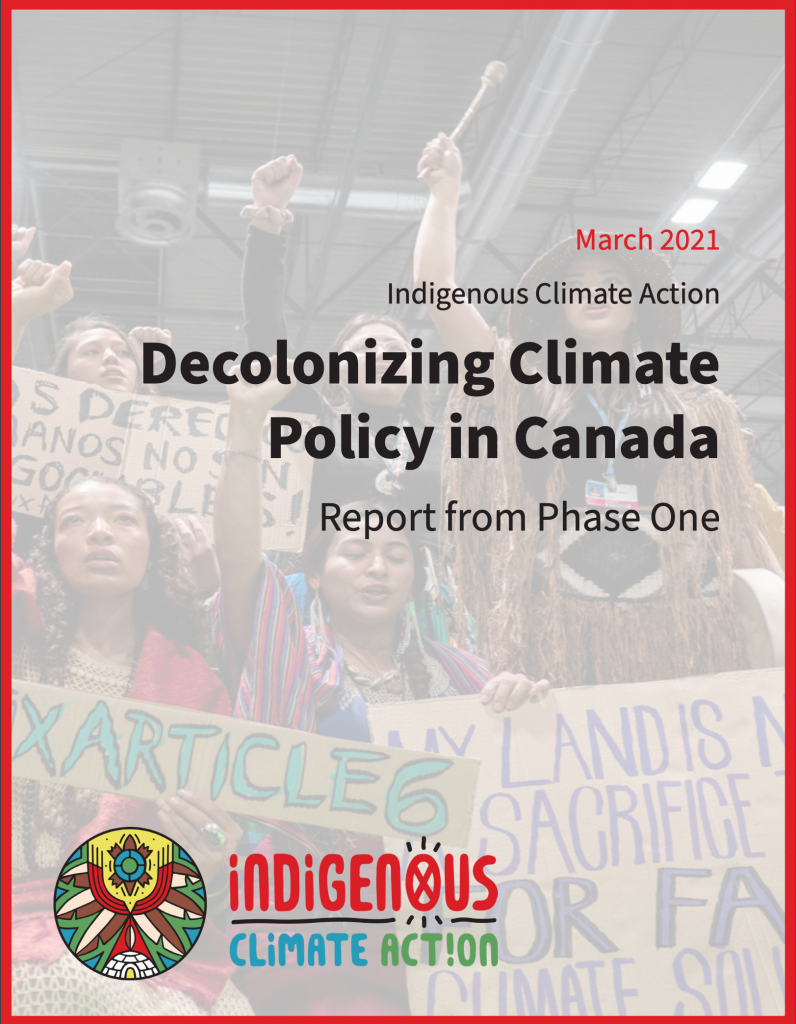Depuis sa mise sur pied, PhiLab se veut un lieu de recherche partenariale, de partage d’informations et de mobilisation des connaissances sur la philanthropie subventionnaire. Nous vous partagons le présent rapport en tant qu’opportunité d’apprentissage et d’action pour les lecteurs. Nous vous invitons à le partager parmis vos réseaux.
Decolonizing Climate Policy in Canada: Report from Phase One
PhiLab is happy to share this new report by Indigenous Climate Action
« It’s an essential critique of some emergent climate action policy that has not taken into consideration the voices, jurisdiction and knowledge of Indigenous peoples. For those of you who know and are aware of the UNDRIP – being involved in these such policy developments are essential to upholding our rights as Indigenous peoples.
In a time where provinces and federal government is talking about Climate action – I implore you to learn about this misstep and find ways to amplify their necessary and urgent take on this and help to make it right by amplifying their work – funding the next phases and or ensuring that your teams, board and networks are aware of and paying attention to this important information. » – Kris Archie, The Circle
Find the PDF version of the report here
Find the executive summary here
PRESS RELEASE
 Indigenous Climate Action, in collaboration with researchers Dr. Jen Gobby, Rebecca Sinclair, and Rachel Ivey, have released an in-depth critical analysis of Canada’s recent climate policy and plans: the Pan-Canadian Framework on Clean Growth and Climate Change (PCF) and A Healthy Environment, A Healthy Economy (HEHE). This is the first phase of a two part Decolonizing Climate Policy in Canada project.
Indigenous Climate Action, in collaboration with researchers Dr. Jen Gobby, Rebecca Sinclair, and Rachel Ivey, have released an in-depth critical analysis of Canada’s recent climate policy and plans: the Pan-Canadian Framework on Clean Growth and Climate Change (PCF) and A Healthy Environment, A Healthy Economy (HEHE). This is the first phase of a two part Decolonizing Climate Policy in Canada project.
The aim of this work was to investigate whether these plans take aim at the root causes of climate change, while also respectfully and meaningfully including Indigenous Peoples and our rights, knowledges, and approaches to climate action. We also sought to examine the efficacy of the PCF and the HEHE in driving meaningful action towards stopping catastrophic climate change.
In our research, we found that Indigenous Peoples were structurally excluded from the process of developing the PCF and the HEHE, thus violating the rights of Indigenous Peoples and conflicting with federal commitments to Nation-to-Nation, Inuit-Crown, government-to-government relationships, and the many Calls to Action emanating from federal inquiries and reports. Some of the solutions proposed ignore the realities faced by Indigenous Peoples in this country and overlook the structural inequalities continuously reproduced through colonial relations and oppressive structures in so-called Canada. Further, some of the proposed actions and initiatives in the PCF and the HEHE may lead to disproportionate negative impacts on Indigenous Peoples and violations of Indigenous rights.
Those who produced the PCF and HEHE, not just the federal government, but also other policymakers and organizations, failed to respect Indigenous rights and sovereignty, and instead put forward climate policies that may serve to perpetuate the drivers and root causes of climate change (i.e. colonialism, capitalism, patriarchy).
CONTACT
Lindsey Bacigal, Director of Communications
@IndigenousClimateAction (FB/Instagram)
@Indigenous_ca (Twitter)

